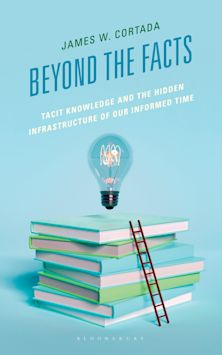- Home
- ACADEMIC
- Philosophy
- Epistemology
- The Expressive Self
The Expressive Self
The First Person in Speech and Thought
The Expressive Self
The First Person in Speech and Thought
You must sign in to add this item to your wishlist. Please sign in or create an account
Description
Expression is typically construed as a relation between two ontologically distinct items—namely, a vehicle and a content—but it is better construed non-relationally, since the content is an intrinsic aspect or quality of the expressive vehicle. Upon this basis, The Expressive Self: The First Person in Speech and Thought argues that the distinctive nature of the first-person perspective must be accounted for in expressive, rather than epistemic, terms. For though others can report on what one expresses, one alone is able to non-relationally express oneself; one alone is able to produce vehicles that are episodes of one’s self-consciousness.
According to Ángel García Rodríguez, the ensuing expressive model of the self provides clarity on some prominent contemporary puzzles, notably Moore’s paradox, self-deception, and McKinsey’s paradox, given the duality of non-relationally expressive and reporting uses of the underlying first-person claims. Moreover, the phenomena of self-reference and first-person authority, both psychological and bodily, pose no objection to the model.
Throughout, the author engages critically with alternative conceptions of the self, delivering a novel account that helps advance the debate about the nature of the self and of the first person.
Table of Contents
Introduction
Part I: Models
1. Special Access
2. Expression
Part II: Puzzles
3. Moore’s Paradox
4. Self-Deception
5. McKinsey’s Paradox
Part III: Challenges
6. Self-Reference
7. First-Person Authority
Conclusion: The Expressive Self
References
About the Author
Product details
| Published | Sep 17 2024 |
|---|---|
| Format | Ebook (PDF) |
| Edition | 1st |
| Extent | 1 |
| ISBN | 9798216267720 |
| Imprint | Lexington Books |
| Publisher | Bloomsbury Publishing |
About the contributors
Reviews
-
“In this exciting new book, Ángel García Rodríguez argues that there is something irreducibly first-personal about what it is to be oneself, something which no third-person account can provide. Rodríguez demonstrates with impressive prowess that the key to this uniqueness of the first-person perspective resides in the notion of expression. Offering novel approaches to both Moore’s paradox and McKinsey’s paradox along the way, The Expressive Self work is essential reading for anybody interested in the nature of the self.”
Constantine Sandis, Director of Lex Academic and Visiting Professor of Philosophy, University of Hertfordshire
-
“The Expressive Self offers an ingenious defense of the view that what makes the first-person perspective important is not an epistemic but a practical capacity, the capacity to express how things are with oneself. Utilizing an insightful distinction between descriptive and expressive claims about oneself, García Rodríguez is able to provide ground-breaking solutions to Moore’s paradox, McKinsey’s paradox, and the puzzle of self-deception. Comprehensive and coherent, this marvelous book—rich with insight—will be immensely valuable to researchers on self-consciousness, and will surely be regarded as a must-read contribution to the philosophy of mind in years to come.”
Jordi Fernández, University of Adelaide

ONLINE RESOURCES
Bloomsbury Collections
This book is available on Bloomsbury Collections where your library has access.

































